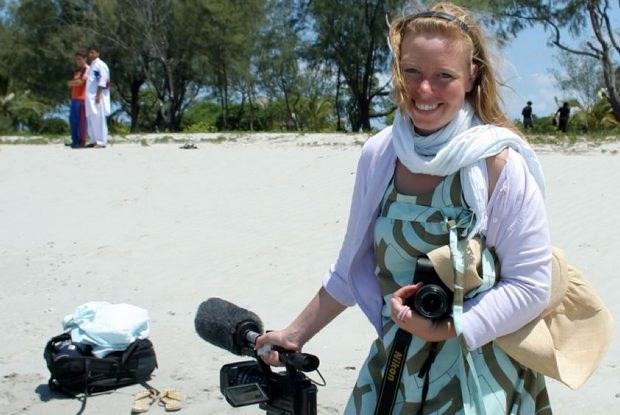Don't believe everything you read about Afghanistan, says Leslie Knott. There are two sides to the central Asian nation - the wartorn country of endless media reports and the "real" Afghanistan - "kind, gentle, beautiful and hospitable."
Knott, 34, is thousands of kilometres away from Victoria, where she studied photojournalism at Western Academy of Photography, did wedding photography and worked at the Premier Correspondence Branch before pursuing her filmmaking career.
She's in Kabul on a mild, sunny day, the air thick with wood smoke at Turquoise Mountain Fort, where she's working with emerging local filmmakers on The Buzkashi Boys, a short film produced in partnership with her non-profit Afghan Film Project.
After graduating from sa���ʴ�ý Institute of Technology's broadcast journalism program, Knott began her Afghan odyssey that has culminated with Out of the Ashes, the cricket documentary she co-directed with Tim Albone and Lucy Martens.
Their uplifting, heartrending film that makes its Canadian première tonight, at 9: 30 at the Odeon, brims with hope while tracing an extraordinary underdog story. It follows Afghanistan's ragtag national cricket team to pre-qualifying tournaments in Jersey, the West Indies, Tanzania and South Africa amid their quest to qualify for the 2011 World Cup.
You needn't be a cricket fan to enjoy Out of the Ashes, since it's more about the triumph of the human spirit as the players, who honed their skills in refugee camps in neighbouring Pakistan, pursue their dream and amusingly react to foreign cultures.
Its central character is Taj Malik, their endearing, upbeat coach who in 2008 decided to try to take the cricketers to South Africa for the World Cup qualifier, convinced cricket is the answer to the world's problems.
"Sport is a symbol of peace," declares Shahzada Massoud, president of the Afghanistan Cricket Federation in a sequence rendered bizarrely ironic since a tough-looking guard wielding a Kalashnikov assault rifle is standing behind him.
Knott's work in Afghanistan began in 2004, when she worked with IMPACS, a Canadian non-governmental organization.
Her documentary began to take shape three years ago after the Richmond, sa���ʴ�ý-born photographer and her friend Tim Albone, a journalist with the Times of London, started brainstorming before deciding to do one based on an article he wrote.
Knott then contacted Malik, who soon became a willing, camera-friendly participant.
After three months, Knott and Albone realized "we had entered a very steep learning curve," so Martens, an experienced camera operator, came on board.
Out of the Ashes wasn't an easy sell, says Knott, who invested her own money the first year of filming.
"We had never made a film before and we had no idea how well the team would do," recalls Knott, whose only previous experience with cricket was watching a match at St. Michaels University School years ago.
They eventually secured funding from Canadian, British and Danish embassies to "keep us afloat" while the team competed.
"Each time they would win it was exhilarating, but at the same time the looming fear was, 'How are we going to pay for a trip to Tanzania? Argentina? South Africa?" she says, noting Symbion, Roshan and Angus Lawson Memorial Trust also pitched in.
After one year of filming, they still didn't have a broadcaster, so Knott contacted BBC Storyville. After viewing rushes, it provided funding in March of 2009. A year later, filmmaker Sam Mendes (American Beauty) came on board as an executive producer and flew to the West Indies with them.
"It was an amazing experience to watch a team literally rise out of the ashes," Knott recalls. "When we were with them in the West Indies and they played India and South Africa, our hearts were bursting with pride."
The shifting timeline was their biggest challenge, Knott says.
"We initially thought they wouldn't win in Jersey and we'd be done. However, they kept winning. So with each win, we had to readjust our schedule."
The pressure increased when the BBC imposed a delivery deadline, forcing them to start editing in November of 2009 for completion by last March. During the edit in February, the team qualified for the Twenty20 World Cup.
"It was so frustrating and amazing at the same time," Knott says.
Along the way, she developed a taste for the players' favourite food, Shinwar karai, a spicy stew of lamb, ginger, tomatoes and jalapenos. "They tried to get me onto the sheep's brain, but I just can't stand the consistency."
Being a woman working with conservative Afghan men who had never interacted with women except for their mothers, wives and sisters was an eyeopener, she adds.
"They couldn't understand why our fathers would let Lucy and I travel alone," she says. "They also felt we were extremely old, and had become 'expired.' "
The players also pitied the women since neither was married and a couple offered to "relieve us of that burden" by taking them on as their second or third wives.
"By the end of production we became familiar to them and they treated us with the utmost respect, as their sisters."
http://www.theroofoftheworld.com/index.html



